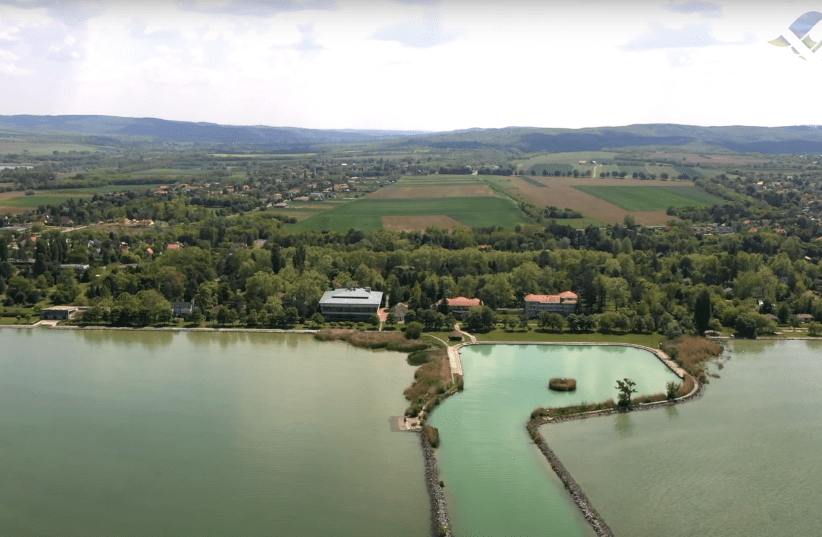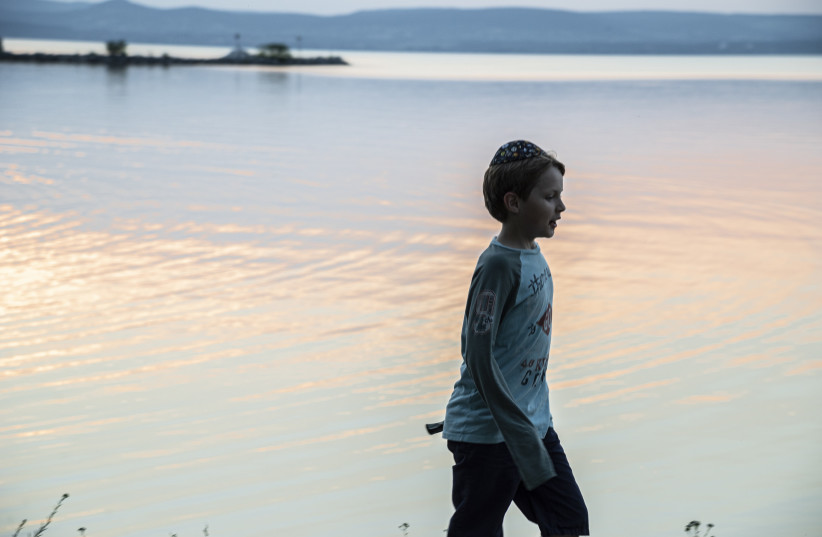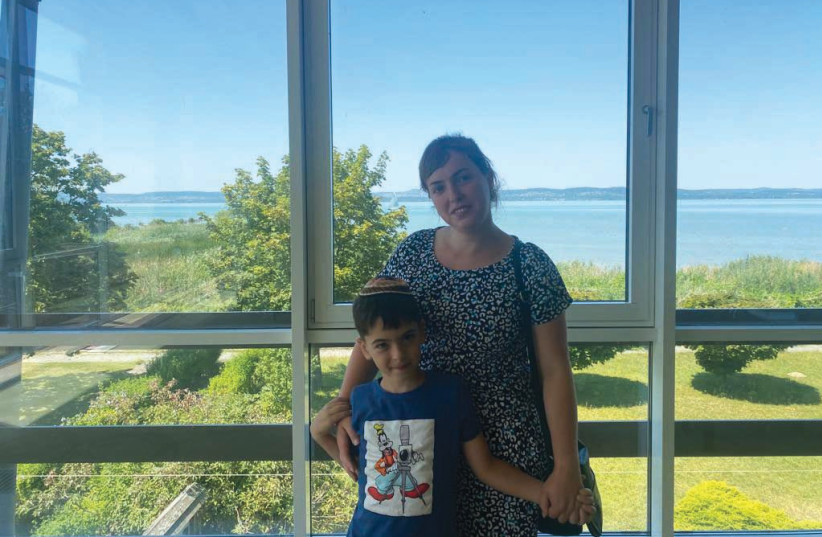In a lakeside resort in western Hungary, some 400 Ukrainian Jews, who were forced to leave their homes all across the war-torn country in the wake of Russia’s invasion, have a place they can call a temporary Jewish home.
In Balatonoszod, on the banks of Lake Balaton, lies the single largest kosher refugee camp in Europe. The 180,000 sq.m. (18 hectares) resort, some 130 km. from the Hungarian capital of Budapest, has seen 2,000 Ukrainian Jews come and go, offering them an escape from the tragic reality in Ukraine.
Balaton was transformed into a safe haven for Jewish refugees only due to the hard work of Slomo Koves, chief rabbi of the Association of Hungarian Jewish Communities (EMIH), and Rabbi Meir Stambler, chairman of the Federation of Jewish Communities of Ukraine (FJCU).
The two rabbis’ project began only days after the war broke out in Ukraine. Stambler called Koves, the latter recalled, asking if he could find a place to host 1,000 Ukrainian Jews for a Passover Seder. “When the war began, I felt as if I had to do something to help,” Koves said.
“I thought this war was unfair on [Ukrainians]… specifically my colleagues at FJCU,” Koves explained, expressing that he felt he owed it to the rabbis and Chabad shluchim (emissaries) in Ukraine to offer what he could to help.
Eventually, the Hungarian government signed off on Koves’s request, and preparations to make the government-owned resort kosher began, including the renovation of many buildings in the resort that have been abandoned for years.
The ultimate goal, Koves said, is to give Ukrainian Jews fleeing the eastern European country a place to live and create a warm home for any Jew.
Balatonoszod: Home of Hungarian scandal
Balatonoszod has a complicated history and was home to one the biggest political scandals in recent Hungarian history, something that might have aided Koves and Stambler in their bid to repurpose the lakeside resort into a Chabad camp.
In 2006, Hungary’s then-ruling party Hungarian Socialist Party (MSZP) hosted its annual congress in the resort, about a month following its election victory earlier that year.
Behind closed doors, then-prime minister Ferenc Gyurcsany delivered the infamous address that is now known as the “Oszod Speech.” In the speech, the socialist prime minister confessed to lying to the Hungarian people “morning, noon and night,” as well as criticizing his party for intentionally misleading the public.
Also known for its excessive profanity, the speech was eventually leaked to the press later in 2006. This resulted in mass protests and outrage as Hungarians took to the streets in protest of their incompetent leadership. The fallout led to the Right’s rise in Hungary, with Prime Minister Viktor Orban achieving a supermajority victory in the 2010 elections.
In the following years, Hungarian officials had little appetite for holding events in Balaton, leading to its abandonment and perhaps paving the way for Koves and Stambler’s transformation of the resort, 16 years later.
A joyful place for Jewish Ukrainian refugees
THESE DAYS, Balaton is a more joyful place to live, cleansed of the implications of corruption, incompetence and charlatanism. Instead, as you walk around the beautiful lakeside resort, all you can see are children and their parents enjoying the summer as they swim in the lake. Teens play soccer, celebrating every goal as if they were scored in the World Cup final. Jewish counselors, who come from around the world, help the refugees forget the life they were forced to leave behind in Ukraine.
Summer camps were also set up for young children, who enjoy the full camp experience in Balaton. But most importantly, the kids have been given a breath of fresh air, allowing them to experience their youth freely instead of dealing with the despair of their country, and their family’s, uncertainty and insecurity.
“The girls had camp for a few days. It was fun for them, they liked it,” said Luiza, a 40-year-old mother of three who came with her husband to Balaton in March after a short stay in Berlin. “The members of our community in Odesa recommended this place, so we came here and we liked it,” Luiza recounted.
Added Luiza’s eldest daughter, 18-year-old Rina: “It’s better here and very comfortable; an amazing place,” as she aided with the translation of her mother’s Ukrainian.
The uncertainty over the future continues to loom over the family, Rina said.
“In our community in Ukraine, our rabbi said to take all of our children and go to Berlin because orphaned children in our community were being taken to Berlin. It all happened so fast. My father returned from the shul one day and said, ‘Tomorrow you’re leaving for Berlin.’”
Rina’s father, 38-year-old Doron, did not travel with the family to Berlin. Instead, he met them in Balaton more than three months later. “We stopped planning ahead because we just don’t know what will be tomorrow,” they admitted. “We will be here through the summer and in the autumn. Maybe we will go to Israel after that.”
Katerina, who came from war-torn Kharkiv with her only son, also shared her experiences of living in the Chabad refugee camp.
“I stayed only one week in Kharkiv after the beginning of the war,” Katerina recalled. “My family and I were hiding in our home, but we were eventually told it would be impossible to stay there because there was no medicine in the city.”
So the family made a decision to leave, Katerina said. She and her son took a Croatian train to the Lviv region, which was heavily crowded. “In our compartment, there were around 12 people and a dog... it could only hold four. We had three or four people sleeping in one bed.”
Katerina and her seven-year-old son would then stay with relatives in Lviv for a period, which was “unsafe for our son,” until they arrived in Lake Balaton a few weeks ago.
Katerina, who works as an export manager in a Kharkiv yeast factory, was allowed to continue her work remotely throughout the Russia-Ukraine war. The factory is still fully functioning, Katerina revealed.
“But it was still safer than Kharkiv,” she admitted, recalling the wreckage that her family left behind in Kharkiv and the destruction that was yet to come.
“My son understands everything that goes on. He understands that it is war now,” Katerina said. “He even told me that for New Year’s, he would like not only a present from Santa Claus but also for the war to end,” she told the Magazine, while letting out an exasperated sigh.
Relieved, Katerina says they have now “finally found a safe place. I am very thankful for the opportunity to stay here. We are having a great time here, mainly because we don’t have to think about housing or cooking food.” This has allowed Katerina time to think about the next steps for her family, she said.
“If I stay in Ukraine, I don’t think it would be a good decision,” she said, when asked about her family’s future. “I cannot send my son to a school if I am not sure a Russian rocket will be launched at the school.”
Some Ukrainian Jews in Katerina’s Kharkiv community “got used to war and hearing explosions,” she said, frankly. “It is impossible for me to go back to the sound of sirens ringing out every day.
“My husband, who just came here a couple of days ago from Ukraine, says it is not as dangerous. However, I am scared of returning to Ukraine.”
Asked about the prospects of making aliyah, Katerina said that it is an option that has been on the family’s minds for years. “Now my husband is here in Balaton with me, so we have a chance to really discuss it.”
Katerina mentioned that her husband was still hopeful of returning to Kharkiv in the autumn, presumably after the war ends. “The problem is that in Kharkiv, we had opportunities to send our son to the best school, we had our car and our house,” Katerina explained. “In Israel, we will not have that.”
“Now, we have no other choice,” Katerina lamented. She told the Magazine that she received pictures of what was once her Kharkiv home, now completely demolished and unrecognizable.
“We asked our friends to go to our apartment to get some of our belongings which we had to leave in Ukraine, so they could send them to us here. But it was all destroyed.”
“So we do not have a place to come back to. We will stay here for some time, but how long? We do not know, but I am learning Hebrew,” Katerina said, anticipating an inevitable immigration to the Jewish state.
“I am Jewish, I love the culture and have visited Jewish camps every summer. I would like to live in a Jewish society,” Katerina said, perhaps swayed by the positive atmosphere created in Balaton with the help of EMIH and FJCU.
A heavy financial cost
THE LAKESIDE resort, turned Jewish refugee camp, is a heavy financial toll. Each refugee costs the Jewish organizations of Hungary and Ukraine around $40 a day to feed and house. Despite that, renovation and additional housing units and attractions continue under the supervision of rabbis Koves and Stambler.
A long-abandoned, Communist-era bowling alley, located outside the cafeteria, is set to be repaired and brought back to working condition for the refugees to enjoy. Housing units, repainted and decorated to feel as homey as possible, are added every day to increase the resort’s capacity.
Despite that, Koves believes that Israel is the place where the Jewish refugees belong. However, he admitted, they are merely offering the Ukrainians, some practicing and some non-practicing Jews, a place to live as a true community once again.
The writer was a guest of the Hungarian Jewish Communities (EMIH) and the Federation of Jewish Communities of Ukraine (FJCU).


